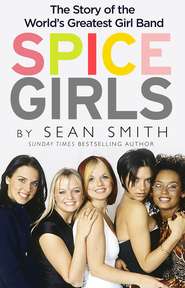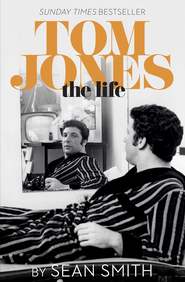По всем вопросам обращайтесь на: info@litportal.ru
(©) 2003-2024.
✖
George: A Memory of George Michael
Автор
Год написания книги
2019
Настройки чтения
Размер шрифта
Высота строк
Поля
They were good enough to enter competitions, and one teenage girlfriend of George remembers him showing her an old black-and-white photograph of his parents dancing. She recalls, ‘They looked amazing, with glamorous hairstyles and clothes like something out of the movie Hairspray. I remember wishing that we learned how to dance like that, proper couples dancing, not just disco.’
Lesley was clearly very proud of her darkly handsome boyfriend. She even entered his picture in a competition run by the now defunct Reveille magazine called ‘Search for a TV Star’. He reached the final and his photograph was published with the memorable caption: ‘Jack Panos is chased down the street by girls wherever he goes’. That may have been a slight exaggeration, but his son would be very impressed by his dad’s achievements, which were kept hidden when he was growing up.
Jack and Lesley were married in 1958. Her father didn’t attend for the simple reason, according to George, that the groom was Greek: ‘In those times, he saw that as absolutely the same as marrying someone of a completely different colour.’ One unavoidable fact was that Lesley from Lulot Street was now Lesley Panayiotou. It was a bold and strong-minded thing to do at the time, following your heart and hoping for a better life.
Jack was twenty-three and his new wife twenty-one. Their prospects didn’t look good as they settled down to married life. The young couple’s carefree dancing days ended to a certain extent when they faced up to the responsibility of raising their first child, a girl they named Panayiota but who everyone called Yioda. Their first daughter was born that October in the maternity annexe of the Royal Free Hospital in the Liverpool Road. At the time, Jack was working on the counter in a grocer’s and they were living in Kentish Town, one of a number of homes around North London in which they had rooms before they managed to buy their own house.
Almost exactly two years later, in October 1960, Lesley gave birth to a second daughter, Melanie, which is a name that sounds very English but is derived from ‘Melania’, the Greek for ‘dark’. Jack was now a waiter and they had moved a few neighbourhoods away to Muswell Hill.
The couple longed for a male child and their wish was eventually granted on 25 June 1963. They named him Georgios Kyriacos. The Greek pronunciation of Georgios is ‘Yorios’, which was a bit difficult for his elder sisters, so they called their brother Yogi, a pet name that stuck with him during his early years.
By the time of his son’s birth, Jack had worked his way up to be an assistant manager in a local restaurant. It would be many years before Georgios fully appreciated his father’s work ethic and commitment to improving the status of his family. ‘The honest truth is that the average Greek-Cypriot is a lot more hard-working than the average English man,’ he observed somewhat controversially. He described his father as the ‘absolute archetypal 1950s immigrant from Cyprus – very determined and every single member of his family made something of themselves. They were typical immigrants that worked their arses off and reaped the rewards.’
On his mum’s side, Georgios never knew his Uncle Colin, her elder brother. He died, aged thirty-eight, in January 1964 from an overdose of barbiturates at the house in Lulot Street when his nephew was six months old. His death certificate grimly contained the words ‘schizophrenia’ and ‘did kill himself’. The tragedy was hidden from Georgios growing up, but much later, as George Michael, he wrote a very personal song, ‘My Mother Had a Brother’, in which he revealed that his uncle was a gay man who had been unable to declare his sexuality because of the times in which he was born. He also said Colin killed himself on the day he was born, but this was dramatic licence.
The family moved yet again, to a small flat above a launderette in Holmstall Parade in Edgware, which was a small group of shops on the main A5 road with a bingo hall on the corner. The flat had a view of a dusty and shabby backyard on one side and the busy road on the other. It was hardly a step up from the familiar streets of North London that Lesley had been loathe to leave, but it better suited Jack’s ambitions.
While still very much London, Edgware had a more suburban feel to it than the old haunts of Archway and Kentish Town. The media liked to talk of ‘Swinging London’ and the ‘Swinging Sixties’ in terms of young Britain finding a new and exciting culture, finally free from the shackles of the Second World War. Jack and Lesley, however, were faced with a much more uninspiring life, trying to save enough to drag themselves out of their working-class monotony while keeping three young children clothed and fed.
At least now they were in the catchment area of a good school. Roe Green Infant and Junior Schools were in Princes Avenue, Kingsbury, less than a mile away from the flat. The junior school boasted the motto ‘Be The Best You Can Be’, a sentiment that resonated in the Panayiotou household and one that, professionally, George Michael was destined to follow.
In the summer of 1968, just before Yogi was due to start school, Jack took his family to Cyprus for the first time. He had not been back there for fifteen years and much had changed. The country had achieved independence in 1960 and joined the Commonwealth a year later. But it was not a stable time and the year of his son’s birth had seen the beginning of violence between Greek and Turkish Cypriots. Greece wanted to absorb Cyprus back into the motherland – a policy known as Enosis – which inevitably led to bloodshed and the destruction of property on both sides. The adult George Michael would remember standing in front of the gates that led to the Turkish sector in Famagusta and being warned by his dad not to go in there because he might legally be shot by the armed patrols.
Jack’s cousin Jimmy and his young family went along on the holiday as well. The two men would still try to see each other in London at weekends despite their work commitments and Georgios became particularly close to Jimmy’s son, Andros, a friendship that would continue into adulthood.
During his time away, Jack’s father had died. The adult George would later comment that he was in little doubt that the grandfather he never knew was extremely strict with his children. He had a very old-fashioned Greek attitude that almost certainly included a degree of physical punishment: ‘I never met my grandfather because he died before my parents met, but everything I have heard points to the fact that he was loved and respected but feared.’ Jack, too, expected his children to be well behaved and respectful of elders, but he didn’t rule by fear. ‘He’s in no way a violent man – he’s a very gentle man,’ said George. Young Georgios received a clip from his father on just two occasions growing up. On the first, he was whining to his tired and overworked dad about a torch he wanted. He was, he admitted, like a dog with a bone and wouldn’t stop going on about it. The second would be a few years later while on another family holiday to Cyprus.
On his return from his first Cyprus trip, Georgios, aged five years and three months, faced his first day of school. To a small boy, Roe Green seemed enormous and forbidding. By a stroke of luck, he walked through the gates at the same time as another Greek-Cypriot boy, Michael Salousti. They were both terrified, leaving their mums watching anxiously as their teacher gathered together her small charges to take them into class. The two boys quickly hooked up with a couple of other Greek-Cypriot children, including George Georgiades, whose parents were also in the catering trade and knew Jack: by coincidence, the two best friends Georgios had at primary school were called George and Michael.
They asked him if his mother was Cypriot as well and he was quick to correct them: ‘No, she’s not. My dad is only.’ He also told them he was ‘special’ when they asked him about the flaky eczema on his legs. His mum had thoughtfully told him to say that so he wouldn’t worry about the condition, which he endured as a youngster.
His new friends called him Yogi and, though he was shy at first, Georgios soon settled into a happy daily routine. Often, if his mother was working in the fish and chip shop, he would go round to the Georgiades’ house after school for his tea and a play before Lesley came to pick him up. The boys would enjoy fish fingers or beans on toast and then sit round and sing along to an LP of The Sound of Music, which they loved. The soundtrack to the popular Julie Andrews film was the second-biggest-selling album of the decade and every home seemed to have a copy. The Georgiades household was no exception, and Yogi would happily join his pal at the coffee table in the lounge to sing ‘Do-Re-Mi’, their favourite tune, which so memorably began with ‘Doe a deer, a female deer’.
The year after Georgios began at Roe Green proved to be a turning point in the fortunes of his family. His father went into partnership with two others in his first restaurant, called Angus Pride, in Station Road, a busy and cosmopolitan street the other side of the Edgware Road. He also had his eye on buying a house in one of the tidy streets that ran between the school and the flat where they were living at the time. He found a three-bedroom, semi-detached house in Redhill Drive, Burnt Oak, which he secured with a mortgage of £4,000. Nowadays it would cost more than half a million.
Redhill Drive is a wide and quiet residential street and a good location to bring up a young family. While the brown, slightly drab-looking house was quite modest at the time, it represented a huge step up the social ladder for his family, in effect from working class to lower middle class. The improvement in status didn’t mean they had an easier life. Lesley was permanently exhausted as she juggled looking after three children with various jobs that included shifts at the restaurant. Jack was mostly absent because of the long hours he spent at work turning the business into a success. He may not have been at home as much as his young son would have liked. He may not have been there to take Georgios to the park as often as the other dads. But he set an example that would prove invaluable. He gave his son the gift of determination.
2
Daydreamer (#ulink_3d866b58-608a-5e26-a07e-e098dc6f84b5)
Georgios was thrilled to have his own room at last at the back of the house, overlooking the garden and, beyond, an old overgrown tennis court that everyone called ‘the field’. The patch of green would prove a happy hunting ground for a young boy interested in nature or just wanting to while away some time picking blackberries or kicking a ball around with friends.
While Georgios did not particularly like his next-door neighbour on one side, a woman he regarded as a ‘real old cow’, he got on famously with the O’Reillys. They were a large Irish Catholic family who lived on the other side. He would often play in the field with their son Kevin and was happy to be watched by Mrs Maureen O’Reilly if his mum was busy. He called her ‘Auntie’. In the Greek-Cypriot community, boys would refer to other mums that way as a mark of respect and regard. Georgios would always do that. Maureen thought Yogi was a lovely little boy with his black curly hair and little glasses. She still recalls him knocking on the front door one day. He had a big grey cat in his arms. ‘Auntie, my cat is dead,’ he told her mournfully, gazing sadly at the motionless creature. ‘Oh, Yogi,’ said Mrs O’Reilly, ‘I am so sorry. Is your mother in? Why don’t you go and tell her?’
In the 2005 documentary A Different Story, George remembered living in the house. He would lie in bed each morning waiting for the sun to come out so that he could go and explore. One summer day, he rose early, crept out of the house and was nowhere to be seen when his mother called him down to breakfast. A frantic search followed until he was spotted in his pyjamas in the field, collecting all manner of bugs that Lesley might not have welcomed into the house. In some ways, Yogi was much more like a young Gerald Durrell than a budding Elton John.
Redhill Drive was one of those streets where everyone knew each other. Yogi made friends with another little boy called David Mortimer, who lived a few doors away. Their mothers had started chatting in the street one day when they were walking with their sons. It turned out that David was also at Roe Green but was a year older, so they saw little of each other at school but in the evenings would play together; it was the start of a lifelong friendship.
As he grew up, leaving the infants’ and moving on to the junior school, Yogi grew in confidence. Michael Salousti recalls, ‘He looked quite eccentric with his curly hair and glasses. He had quite a funny sort of fuzzy hair but, always, a really nice happy smile. He was sensitive though and was very conscientious about teasing other children.’ Yogi was always quite stocky and big for his age, so, while he would never get into scraps at school, he was perfectly happy to stand up to bullies if they were picking on another boy. Michael adds, ‘We were both bigger kids and would stop kids being bullied. We weren’t heavy-handed about it. It was more a case of trying to explain to another boy, “Why would you want to bully that youngster?”’ It would be stretching the point to suggest that Georgios had a social conscience at such a young age, but he did show kindness, particularly to one boy who was smaller and always the target for the class tormentors.
He thrived at junior school under the watchful eye of his form teacher, Mrs Anne Ash. These were the days when pupils had to show their teachers the utmost respect. In return, Mrs Ash treated the boys and girls with consideration: ‘She was a lovely teacher,’ recalls Michael. ‘Things may have changed now but there was no rudeness back then. There was no talking while she was talking.’ Georgios was a very polite boy. Every morning he would greet his teacher, ‘Good morning, Mrs Ash’, and she would respond courteously, ‘Good morning, Georgios.’
He joined the school choir and sang in the Harvest Festival and Christmas concerts in front of proud parents, including Jack and Lesley, who would crowd into the school hall. This was not, however, the start of a golden school singing career for Georgios. The teacher in charge of the choir would not stand for any indiscipline and she was very tough on any talking. On one occasion, Georgios forgot the golden rule and was whispering away to Michael at the back of the class when the teacher pointed them out and dismissed them from the choir there and then. He was not particularly upset: growing up, Georgios had shown very little interest in music. He didn’t care for the Greek folk music his father would insist on playing around the house. Indeed, Jack’s only artistic talent seemed to be an ability to balance a plate or a drink on his head while dancing.
Georgios wasn’t the least bit sporty, although he could run fast as a boy. He was more of a geek, read a lot for his age, was articulate, and useful at arithmetic and algebra. He was always a bit lazy academically, bright enough to do the minimum and still pass all his exams. He was never much of a team player, didn’t follow a football team and didn’t join in the games of rounders or French cricket at break times or in the park after school. His principal interest was still nature until an event occurred, one he later described as ‘very strange’: he fell down the staircase at school when he was running for lunch. It was his Damascus moment.
He told Greek television, ‘I had a very bad fall, cracked my head and, in the year consequent to the accident, not only my interests but my abilities seemed to change. Before the accident, I was very interested in nature and biology. I was a fairly good mathematician and obsessively read books all the time. But after the accident, literally within two weeks, I brought home a violin – unfortunately a violin – and within months was obsessed with music. I had lost the ability to do any maths and lost my interest in nature and bugs, insects and stuff. So, my interests changed dramatically after that event. Not my personality though. But I have to believe that I wouldn’t have been a musician. It is possible that a flight of stairs contributed to musical history.’
Interestingly, in that particular interview George Michael was asked the questions in Greek but responded in English. As a boy he joined his sisters for Greek lessons at weekends but didn’t enjoy them, mainly because they were held on a Saturday when he had far better things to do aged seven or eight than to learn a very difficult foreign language. Every weekend a ‘crappy little van’ would collect them and other local children and drive a few miles to Willesden, where they would sit in a classroom for private lessons. Georgios gave the impression of making progress, but in reality after two years he could speak only a few words, although he did understand more than he let on. He was at a disadvantage compared to his friends at school who had two Greek-speaking parents. Lesley never bothered much with the language and she always spoke English to her children. It might have been different if Jack had been able to spend more time at home with them when they were growing up.
Jack’s determination to provide a better life for his family was beginning to pay off in terms of the presents he could buy his children and the holidays they could now afford more easily. Georgios loved the bicycle he was given on his seventh birthday. It was purple and blue and his most prized possession. He could now cycle up the road to see his pal David, who had actually moved to another house further up the same street, to the ‘posh end’ as George would later laughingly describe it.
You can often tell how well a family is doing by the things they chuck away. One afternoon after school Georgios was messing about in the garage when he came across an old wind-up gramophone that his mother had thrown out. It was the sort of retro piece of equipment that would be highly desirable now, but then it was just a dusty old antique. The record player became his principal preoccupation, especially when his mum gave him three old 45s to play – two tracks from The Supremes, the premier sixties girl band, and one from the leading British vocalist of the age, Tom Jones.
He would come home from Roe Green and, instead of dashing out to the field, he would hide away in his bedroom with his music: ‘I was totally obsessed with the idea of the records. I loved them as things and just being able to listen to music was incredible.’ George Michael would never have much in common with Tom Jones, the epitome of Welsh masculinity, but some of the later dance tracks of Wham! would have an affinity with the easy soulfulness of Motown. Lesley would have loved to dance to them if she hadn’t been so busy in the chip shop. At least Tom and Diana Ross were much cooler early influences than the Julie Andrews songbook.
For his next birthday, his parents bought him a cassette player with a microphone and he was able to tape the latest hits from the radio. He loved recording things; he and David became ‘The Music Makers of the World’, the name they gave themselves, and prepared to take pop by storm from the comfort of their homes in Redhill Drive. They also started to make their own tapes, of funny moments and little sketches that would have them howling with shared laughter. It was a pastime that Georgios continued to enjoy through much of his life.
Georgios had never bought a record. That was to change on the annual trip to Cyprus when he was ten and splashed out on ‘The Right Thing to Do’ by Carly Simon, which was a minor hit in the UK in 1973 when it was the follow-up to her best-known track, ‘You’re So Vain’. Carly Simon was one of the hugely popular group of female singer-songwriters of the early seventies that included Joni Mitchell and Carole King. They combined catchy melodies with heartfelt, introspective lyrics that often told a story of damaged love. She was the perfect choice for a sensitive boy like Georgios Panayiotou who, regardless of any future image, was always in touch with his feelings. ‘The Right Thing to Do’ was a song about Carly’s relationship with her then husband, James Taylor, another acclaimed musician of that age. The sentiment is a romantic one – ‘Loving you’s the right thing to do’ – but there’s a tinge of realism, of fading attraction and the need for reassurance … ‘Hold me in your hands like a bunch of flowers’.
This particular trip to Cyprus also marked the second time Georgios received a scolding from his father. He was with his cousin Andros when they developed a taste for nicking things from a local shop. They began by stealing sweets, some they ate while others they hoarded. Eventually their thieving got out of hand when they made off with a carton of Dinky toy cars. The shopkeeper realised it was them, found their stash and told their parents. Jack without further ado smacked his son around the legs, which effectively prevented Georgios from becoming Cyprus’s most wanted.
At least Georgios paid for ‘The Right Thing to Do’. Carly Simon had a touch more credibility than his other favourite record of that year: ‘Daydreamer’ by teenage heart-throb David Cassidy, who made a successful transition from television actor to pop star. David first found fame as Keith in the popular early seventies sitcom The Partridge Family. He sang lead vocals on a number of hits as part of the TV cast, including the number one ‘I Think I Love You’, before breaking through as a solo artist with hit singles ‘How Can I Be Sure’ and ‘Could It Be Forever’.
For a while, when ‘Daydreamer’ was at the top of the charts, Cassidy’s face stared down from the walls of a million adoring young teenage girls. He was blue-eyed, with immaculate teeth and hair, and, most of all, he was non-threatening; he was clean-cut and safe. Georgios liked both the song and the image of Cassidy. He never forgot the first time he saw the American star on television, heading a football on the roof of the LWT building on the South Bank. The camera panned to the ground below and there were thousands of girls screaming at him. He saw the adulation that Cassidy’s fame brought him and, although he was only ten, realised he wanted that for himself. Georgios longed to be put on a pedestal and adored from afar – famous but untouchable.
For a while Cassidy seemed to be on Top of the Pops every week. The long-running programme was essential viewing on Thursday evenings, and the following day it would be a major topic of conversation in the playground. He would join his friends to sing along to most of the chart hits, as did boys and girls all over the country.
On one rainy autumnal day the weather was too dismal to go outside, so everyone had to stay in the classroom for break. At that age, the boys tended to stick together at one end of the room and the girls would be grouped at the other. Georgios and Michael Salousti sat underneath a table and proceeded to give a rousing rendition of ‘Daydreamer’. ‘We were just singing away, minding our own business,’ Michael recalls. ‘You can imagine the scene – a bunch of kids making a lot of noise. We thought we couldn’t be heard amongst all the chatter. We didn’t notice, however, when it all went very quiet. Mrs Ash had walked in and there we were still singing, “I’m just a Daydreamer, I’m walking in the rain …”
‘Suddenly, all we could hear were the other children laughing away. And there was Mrs Ash looking down at us, trying her best not to chuckle away as well. You could tell she was desperate to burst into laughter. So we had to creep out from under the table completely red-faced and embarrassed.’
Georgios didn’t regard this as his first public singing performance, preferring to remember the less awkward gang shows that he took part in as a member of the local scout troupe. They used to meet in a hall near the school and he would wander down every week with Kevin O’Reilly from next door.
Mostly, his musical tastes were very much middle-of-the-road and focused on the charts and what was playing on Radio 1. This was an age of flamboyance and the rather feminine world of glam rock, where pop stars seemed most worried about blow-drying their hair and pouting for the camera – and that was just the men. Image ruled as acts such as The Sweet, Mud and Gary Glitter hogged the charts. There was little room for autobiographical contemplation in the lyrics of hits like ‘Tiger Feet’ and ‘Blockbuster’.
The ten-year-old Georgios Panayiotou was impressed, but the three acts that had most impact on him then were Queen, Roxy Music and Elton John. They had much more credibility among music critics. Queen first appeared on Top of the Pops in March 1974, performing their debut hit ‘Seven Seas of Rhye’. Georgios became an instant fan, much to the amusement of his friend Michael, who would tease him about it: ‘I used to laugh at it. I would say, “Queen are rubbish, Georgios. Who likes Queen? Nobody likes Queen.”’ Surprisingly perhaps, he did not choose a Queen track when he appeared on Desert Island Discs in 2007, although he didn’t forget all his childhood favourites. He picked ‘Do the Strand’, released by Roxy Music when he was ten.
None of his friends were particular fans of Elton John. He was never an artist that inspired great devotion, but over the years he was a huge influence on the music of George Michael. The melodies of the suburban superstar from Pinner were a pleasure best enjoyed in quieter moments. He liked the catchy hit ‘Crocodile Rock’ and could often be heard singing, ‘I remember when rock was young, me and Suzie had so much fun’ in the garden. He much preferred it to the more aggressive ‘Saturday Night’s Alright for Fighting’ that often ended Elton’s shows.
The man born Reg Dwight had become one of the biggest superstars in the world despite a less-than-promising appearance. He was chubby, short-sighted, with an ongoing fixation with his hair, or lack of it, but was an aspirational figure for an impressionable ten-year-old boy from the suburbs – who was chubby, short-sighted and struggling with his hair.
At that age, Georgios pretty much liked everything in the charts, and that even included The Wombles; they featured in a school project he devised. ‘He could be very inspirational about certain things,’ observes Michael. ‘In our last year at junior school, we were put into groups and had to come up with a social project. So Georgios had the idea that we should all be Wombles. They were really popular at the time, clearing rubbish and keeping Britain tidy. The idea was to make things from the rubbish you collected. Georgios was very much the lead and took it upon himself to do the whole thing. He decided he wanted to be Orinoco, who was basically the most popular character. I had to make do with Uncle Bulgaria.
‘The best part was devising banners and posters with Mrs Ash that explained why you should keep the school tidy. We put them up around the school. It was such a success that we got commended by the headmaster in assembly.’
Once Georgios felt comfortable, he had the confidence and ability to take control and make something a success. It was one of the traits he inherited from his father.










